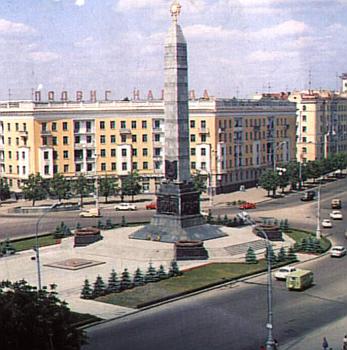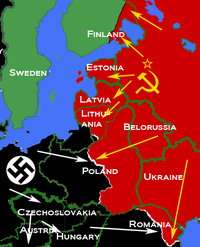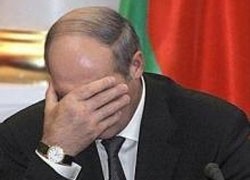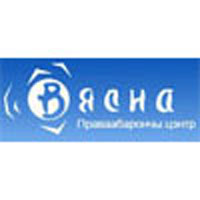Yanukovych in Minsk, Manufactures in Belarus, German interest, Taxes, Kyrgyz-type turmoil, Elections; News, Sport, Culture and Polish scandal...
| #507 |
Nothing behind Lukashenko-Yanukovych meeting
From: BelTA
 |
“Someone gets all tense about our relations. We are not going to be friends against someone. Belarus is not going to get involved into geopolitical problems. It is not in our interests and I think not in Ukraine’s,” stressed Alexander Lukashenko.
The Belarusian head of state remarked that Belarus and Ukraine have to model their economies to make them no different from Europe, to allow people to live well. “I am confident you have the same goal to reach,” the President of Belarus told his Ukrainian counterpart.
Alexander Lukashenko reminded that back in Kyiv the heads of state agreed to meet soon in order to discuss what experts had worked on, to disregard what is no longer topical and to talk over the matters that need to be addressed soon for the sake of interests of the two countries and the nations. He added that some kind of a roadmap for Belarus-Ukraine relations will have to be developed. “They say that the present meeting was organized too fast, there is no agenda,” said the Belarusian head of state. “Our specialists had been working hard in all areas: the heads of the administrations of the presidents and the governments”.
Alexander Lukashenko believes that the presidents will have time to meet more than once. For instance, the next meeting may be held at the Belarusian-Ukrainian border to table transboundary and interregional cooperation of the two countries.
“I think in the near future the possibility of organizing such a meeting will be worked on. The meeting will reveal our true intent regarding each other,” said Alexander Lukashenko.
Mutual respect and consideration of each other’s interests can solve any problems
It is possible to resolve any problems if there is mutual respect and consideration of each other’s partners' interests, and the meeting between the Presidents of Belarus and Ukraine has proved it, said President of Belarus Alexander Lukashenko following the talks with his Ukrainian counterpart Viktor Yanukovych on 29 April.
Alexander Lukashenko said that the two presidents held a very detailed and sincere exchange of opinion on almost every issue of the bilateral agenda. He also noted that the people of Belarus and Ukraine have been waiting for serious progress in the bilateral relations in past years.
The two presidents outlined the avenues of cooperation that will bring the Belarusian-Ukrainian relations onto a new level. The sides succeeded in reaching agreements on such issues as close interaction in power engineering, transport, industrial cooperation, regional cooperation, cross-border trade, and cultural interaction.
"We have found mutually acceptable options to solve our financial problems. We will finish the negotiations over the borders in the nearest future. On the whole, we can say that we have formed an ambitious program of action. I am confident that the implementation of the concluded agreements will largely contribute to the strengthening of sovereignty and independence of our countries and enhance the role of our region in Europe,” summarized Alexander Lukashenko.
According to Viktor Yanukovych, the two presidents have discussed a number of problems of current importance together with the issues that remained unsolved in the recent decades. The Ukrainian President believes that the two countries have to create a legal framework in the customs issues and establish cross-border trade.
Speaking on the 65th Anniversary of the Victory over Nazis, Viktor Yanukovych said that Belarus, Ukraine and Russia are planning to hold a number of joint events. In particular, the three countries will improve the social security of the war veterans. Alexander Lukashenko noted that he and Viktor Yanukovych will travel to Moscow on 8 May ‘to pay tribute to those people, who marched through Red Square and demonstrated our unity since the hard 1941 and henceforth.’ Apart from that the military men of the three countries will partake in parades in Minsk, Kyiv, and Moscow. “The three countries will also hold other joint events including those in the border areas, ‘in order to demonstrate that although we have borders, these are the borders of peace and good between the closest nations,” said the Belarusian President.
Minsk companies-importers should create their own manufactures in Belarus
From: BelTA
 |
According to Nikolai Ladutko, the issue of increasing sales on foreign markets is getting to the forefront today. Importers need to develop the manufactures in the capital city, in the Minsk free economic zone and start exports. “We are not saying ‘no’ to you business. We are saying ‘yes’. But we would like you to get involved in export operations,” Nikolai Ladutko said. He instructed the chiefs of the privately-owned companies-importers to develop business plans on creating manufacturers inside the country.
In January-February this year more than 6,600 economic entities were involved in import in Minsk. Of them more than 5,800 do not have any departmental subordination. They imported goods to the tune of $764 million. The Minsk total import came to $1 billion.
There are 150 large importers in Minsk. The Minsk City hall recommends them to start exporting or to create their own manufactures. Certain results have been already achieved. In 2010 over 10 import-substituting manufactures will come on stream. The plans on the table are to start producing children’s and women’s hygiene products, metal constructions, housewares and so one. According to preliminary estimates, this will reduce import by $55 million a year.
In January-February Minsk had a trade deficit of 563.2 million, down $32.3 million as compared to the same months a year ago. Minsk is set to get a trade surplus by the end of 2012.
Platzeck’s visit proves German interest in Belarus
From: BelTA
 |
Matthias Platzeck visited Minsk together with a group of German businessmen interested in the implementation of various projects in Belarus. His previous visits to Belarus were in 2007 and 2009.
This time Matthias Platzeck met with Prime Minister of Belarus Sergei Sidorsky, Head of the Presidential Administration Vladimir Makei, Foreign Minister Sergei Martynov, Chairman of the Minsk oblast executive committee Leonid Krupets. The sides considered cooperation prospects for the use of renewable energy, energy saving, transport, logistics, education, enhancement of qualifications of the managerial staff.
The heads of government of Belarus and Brandenburg signed joint declarations on the development of cooperation in the area of renewables, logistics and economic cooperation. The German delegation was interested in developing contacts with the authorities of the Minsk oblast. After visiting the oblast the German delegation offered to work out a programme of long-term contacts between the Minsk oblast and Brandenburg.
The delegation of German businessmen agreed to analyze promising projects with the Belarusian partners.
Matthias Platzeck attended the international scientific and practical conference, Workshop of the Future – Bridge of Energy Efficiency and Renewable Power, arranged by the Minsk-based Johannes Rau International Centre for Education and Exchange and a roundtable, New Management Structures of the XXI Century. Brandenburg Land Experience, organized by the Friedrich Ebert Foundation.
Belarus' tax administration to be further streamlined in 2011
From: BelTA
 |
In his words, Belarus aims to make it into the list of top thirty countries with the best doing business conditions in the near future. The country’s tax system was heavily criticized by the experts during the previous years. According to Andrei Tur, this year Belarus is expected to make a serious progress in the tax system reform. He reminded the Special Part of the Tax Code has taken effect this year. “We were able to reduce tax burden by 1.9% during this period that would be taken into the rating. Tax payments were cut on 23 positions. The simplification of the tax administration is underway. I think we will make more headway in the issue this year,” he stressed.
Andrei Tur added that the work on improving the tax system of Belarus will be continued in 2011.
French Vanderbilt to stage flax cultivation experiment in Belarus
The French company Vanderbilt has started a flax cultivation experiment in Belarus, Deputy Agriculture and Food Minister of Belarus Vasily Pavlovsky told a press conference on 30 April.
The Agriculture and Food Ministry had requested the French company to stage an experiment to compare the company’s flax cultivation technology with Belarus’. Six fields were available and two 10-hectare fields with increased acidity were chosen. They are located near Dubrovno and Lida. The two fields will also be used to cultivate flax using the Belarusian technology. “We will compare the two methods to find out which one is more effective and why,” said Vasily Pavlovsky.
The French company has been permitted to use crop protection agents, which are not registered in Belarus, as well as mineral fertilizers and its own equipment.
The Deputy Agriculture and Food Minister added that Belarusian scientists recommend sowing flax on fields with 5.5-5.8 pH acidity. In France acidity can be as high as 6.5-7 pH. “All the varieties which are used in France, Belgium, Holland are more adapted to increased soil acidity. This is why last year and this year Belarus will sow some fields with foreign flax seeds,” remarked Vasily Pavlovsky.
Belarus’ dairy export impressive
Belarus has become a major exporter of dairy products, Agriculture and Food Minister Semyon Shapiro told media in Vilnius on 30 April.
According to the official, Belarus now accounts for 11% of the world’s butter export, 5.7% of the world’s cheese export while the country accounts for only 1% of the global milk output. Semyon Shapiro explained that many countries are satisfied with manufacturing the amount of dairy products, which is sufficient for their domestic demand. Australia, New Zealand, Brazil Argentina and Belarus are major exporters of dairy products.
Asked about prospects of promoting Belarusian dairy products into the European Union, Semyon Shapiro said that several veterinary and customs matters have to be addressed before that happens. “In the future we will have to balance the relations in customs duties, to work out equal terms of the access of commodities to our markets,” said Semyon Shapiro. He added that in Belarus only products of the Verkhnedvinsk dairy factory are certified for compliance with European standards. But it is just the beginning. A complex of things will have to be dealt with before Belarusian products are shipped to Europe.
The Belarusian Agriculture and Food Minister was supposed to take part in the international expo AgroBalt 2010 that opened in the Lithuanian capital city on 29 April.
Opportunities are opening up for Belarus and Ukraine to change geopolitical situation in the region, Lukashenka says
From: naviny
 |
Belarus and Ukraine should become major players in their region, Mr. Lukashenka stressed.
"I'm confident that opportunities are now emerging for us to change the geopolitical situation and make geography serve our nations," he said. "This is confirmed by the fact that, in the eyes of the European Union and Russia, Belarus and Ukraine are attaining a significance that allows us to play a more self-sufficient role in the geopolitics of Europe."
To take advantage of these opportunities, Belarus and Ukraine should establish themselves as really self-sufficient partners that coordinate their activities, Mr. Lukashenka said.
According to the Belarusian leader, his talks with Mr. Yanukovych were meant to give "a most powerful impetus to improving the whole architecture of bilateral relations."
Belarus leader warns against Kyrgyz-type turmoil
From: washington post.com
 |
"We have a crucial campaign ahead of us, an arduous campaign," local news agencies quoted Lukashenko as telling villagers on a visit to eastern Belarus. He said that if he sought another term, as is expected, "it will get even harder."
"You must not relax, in order not to permit what is happening in some republics, what recently happened in Kyrgyzstan," he said. "This is what we don't need. If somebody is applauding and rejoicing, it's not the Kyrgyz people."
Lukashenko was referring to an April 7 uprising that ousted Kyrgyz President Kurmanbek Bakiyev and killed at least 85 people in the Central Asian nation.
The authoritarian leader's statement may be seen as a tough warning to Belarus's vocal but fragmented opposition, which staged street protests after Lukashenko' re-election in a 2006 vote judged to be neither free nor fair by the West.
The next presidential election is due in February 2011. Lukashenko, in power in the former Soviet republic since 1994, oversaw constitutional amendments in 2005 that removed limits on the number of terms he can serve.
KYRGYZ SYNDROME?
The 55-year-old leader, who once pledged to build a "union state" with giant neighbor Russia but has since fallen out with Moscow, has rapped its prompt recognition of the interim government that claimed power in Kyrgyzstan after the revolt.
In an apparent effort to annoy Russia, Lukashenko allowed Bakiyev to come to Belarus last week and vent his criticism of Moscow, which he says may have played a role in his overthrow.
Lukashenko, who calls Russia's policy toward Kyrgyzstan "shortsighted," threatened last weekend to snub a May summit of the Moscow-dominated CSTO security pact of ex-Soviet states unless its agenda included Kyrgyzstan's "bloody coup d'etat."
The outspoken leader, whose ties with former ally Russia have soured after a series of trade wars and rows over prices for Russian oil and gas, hinted that Moscow, like his critics in the West, may be keen to see him go.
"You see, someone -- both in the East and the West -- does not like the current president. Naturally, they are itching to sneak in here," Lukashenko told rural residents. "I don't worry about this much, I'm just telling you: you should not relax."
'Weary' Lukashenko has no fear of losing presidency
From: ria novosti
 |
Presidential polls are set for February 6, 2011 in Belarus. Lukashenko has been in office since 1994 in the former Soviet republic.
"Frankly speaking, I have already had my fill of work. If you find a new president, I will feel no fear. Anyway, he has to be found sooner or later. If you find him - fine," Belta quoted Lukashenko as saying in a speech in southeast Belarus's Gomel Region.
"You see, somebody doesn't like the current president, both in the West and in the East. ... They itch to step in here. I don't mind this, but I am just telling you - do not lose your grip," Lukashenko said.
On the subject of the recent developments in Kyrgyzstan, Lukashenko said the Belarus people should be careful not to allow a similar scenario to unfold in Belarus.
Cuba to Take Part in Belarus Media Exhibition
From: Cuba Headlines
 |
Cuba is going to take part in the Belarus 14th Mass Media International Specialized Exhibition which takes place every year in this capital, the First Deputy Minister of Information announced.
Cuba is to participate with a stand of 968.75 square feet in this event, which will have a total of 80 halls of national media, of Ukraine, Latvia, Lithuania, Poland, China, Iran and India.
The hall of the Cuban press will exhibit newspapers and printed magazines and will promote some Internet media versions in different languages.
The celebration of the 65th anniversary of the fall of fascism will be the theme of the event.
Cuban stand will homage to the journalist work of the Cuban Revolution Leader Fidel Castro and will distribute leaflets written in Russian of one part of his Reflections.
Cuba will also present documentaries related to the U.S blockade to the Island and the struggle for the liberation of Antonio Guerrero, Ramon Labanino, Rene Gonzalez, Gerardo Hernandez, and Fernando Gonzalez.
The films will show also the achievements of the Island in these 50 years of Revolution.
The event will be useful for the press media to exhibit their technological advances in the sector including the development of cable operators and the network of satellite channels, of which there are a hundred in Belarus.
PACE freezes contacts with Belarusian regime
From: Charter '97
 |
The resolution was adopted by a majority of votes at a PACE session in Strasbourg on April 29.
The resolution was adopted with 58 out of 67 votes in favour, 6 against and 3 abstentions, BelaPAN reports.
“Get lost!” Christos Pourgourides, rapporteur on Belarus of the Assembly’s Legal Affairs Committee, commented on the position of Belarusian authorities towards the Council of Europe and PACE.
As ucpb.org website reports, another Cyprian PACE member: “Lukashenka doesn’t care about our resolutions. He is sure will kneel to him. We should put an end to this. We shouldn’t have any contacts with the Belarusian authorities.”
The resolution notes a “lack of progress” towards Council of Europe. In particular, the document says that two executions were carried out in Belarus “in conditions of total secrecy” at a time when the United Nations Human Rights Committee had requested a stay in the executions pending its examination of their cases. The resolution also mentions the facts of violations of the rights of the Polish minority in Belarus and absence of international observers at the local council “elections”.
The resolution regrets “lack of political will on the part of the Belarusian authorities to embrace Council of Europe values” and calls to continue the dialogue with Belarus.
In view of the recent executions, the Assembly has adopted a decision to “put on hold its activities involving high-level contacts between the Assembly and the Belarusian parliament and/or governmental authorities”, the PACE resolution says, Interfax informs.
It became known yesterday that the PACE president cancelled his visit to Belarus.
On April 29, leader of the United Civil Party Anatol Lyabedzka had a meeting with Mevl?t Cavusoglu, President of the Parliamentary Assembly of the Council of Europe.
“We have discussed a range of issues,” Anatol Lyabedzka told ucpb.org website after the meeting. “I presented our vision of the roadmap on Belarus’ accession to the Council of Europe and PACE, and the monitoring of the recent electoral campaign carried out as part of the Tell the Truth campaign. I tried to conduct a concrete dialogue and focused on the facts of harassment of independent journalists, the situation with the Union of Poles, and a tendency to control the Internet. But the main question is what should be done. Now much depends on the political will of the Assembly. We are ready to discuss an issue on the roadmap with the Assembly and representatives of the Belarusian authorities.”
The PACE President noted he had to cancel his visit to Minsk due to the recent actions of the Belarusian authorities.”
The United Nations Human Rights Committee earlier deplored the executions of two people, whose cases are currently pending before the Committee. The Council of Europe, Amnesty International, and Belarusian human rights activists have also condemned the actions of the Belarusian authorities.
Belarus is the only country in Europe where the death penalty wasn’t abolished. In June 2009, the Parliamentary Assembly of the Council of Europe adopted a resolution on restoring special guest status in PACE for Belarus on a condition of imposing moratorium on death penalty. The European Union also calls on imposing moratorium. This is one of the conditions for lifting visa sanctions on Belarusian officials extended by the EU until October 2010.
HR activist’s office searched
From: Viasna
 |
No other details are yet available.
According to the latest information, the police seized a PC, DVDs, numerous printed materials and flags.
Lawbreakers go to Chysts Council
As it was reported before, on 25 April 4 candidates running for the Chysts Village Council (Maladechna district, Minsk region) – Siarhei Miroshnikau, Halina Kurylovich, Alena Ulchyts and Stanislau Bazhko – appeared to be members of various local election commissions.
However, under par. 20 of Art. 68 of the Electoral Code, ‘the authority of the person, nominated for a local council, who is member of the Central, constituency, territorial or divisional election commission, is considered invalid from the moment of his or her registration as a candidate.’
The violation was appealed at 15.20, 25 April, i.e. 7 hours after the beginning of voting. The appeal lodged with Maladechna District Prosecutor’s Office, claimed that the official had blatantly violated the electoral legislation and demanded to declare the elections at the polling stations invalid, as well as to cancel the registration of the candidates.
Ms. Lidzia Yarmoshyna, chair of the Central Election Commission, later announced that Siarhei Miroshnikau, Halina Kurylovich, Alena Ulchyts and Stanislau Bazhko had been removed from the election commission, and thus were unable to take part in the vote counting.
At the same time, the lawbreakers were elected deputies of the Chysts Village Council.
‘Human Rights Defenders for Free Elections’
Russia Wants Right to Prosecute Parents Who Abuse Adopted Russian Kids
From: ABC
 |
Many adoptions are in limbo after a Tennessee woman sent her adopted 7-year-old son back to Moscow alone with a note in his pocket saying she didn't want to parent the boy anymore. A Pennsylvania couple was also charged this week with homicide in the death of another 7-year-old boy who had been adopted in Russia.
"We just need to have some safety guarantees for our kids which we send to adoption to the United States of America because right now without an agreement we don't have any possibility to check our children to know about their future and to make sure that everything is OK with our children," Pavel Astakhov, Kremlin's ombudsman for children's rights, told ABC News
A State Department delegation described its discussion with Russian counterparts over a new agreement to govern adoptions of Russian children by Americans as "fruitful," but ongoing. The State Department wouldn't comment on Russia's request to pursue legal action against Americans beyond calling it "a complicated legal problem."
"We agree that we want to do what's best for children and we have formed a working group," Deputy Assistant Secretary of State Michael Kirby told reporters outside the Foreign Ministry on Thursday. He said that the talks will resume on May 12.
Astakhov said he expected an agreement very quickly, but warned that without one adoptions to the United States could grind to a halt.
"I think our parliament is ready to cancel it all, and make an amendment in family court and to prohibit foreign adoptions," Astakhov told ABC News. "I don't want it so, but it can be."
Though the U.S. is a signatory to the Hague Adoption Convention, the two countries don't have a bilateral legal agreement in place. Russia is the third largest source of adoptions for Americans after Ethiopia and China, with some 1,600 children adopted from Russia last year, according to the State Department.
Adoptions Slow Down But Continue Despite Suspension
Russia demanded this agreement and announced a suspension of adoptions to the U.S. after a Tennessee mother sent her 7-year-old adopted Russian son back to Moscow on a plane alone. Torry Hansen pinned a note to Artyom Savelyev – whom she renamed Justin Hansen – saying she no longer wished to parent the child, calling him "psychopathic."
President Dmitry Medvedev called Hansen's actions a "monstrous deed" in an interview with ABC News and on April 15 the Foreign Ministry announced a suspension of adoptions.
Adoptions continue despite the alleged suspension, largely due to the fact that the Ministry of Education and Science, not the Foreign Ministry, is in charge of adoptions. Many courts in Russia's regions continue to process applications and award children to families, while others await instructions from Moscow on how to proceed.
About 3,500 children are waiting to be adopted by American families, according to the Joint Council on International Children's Services. It's unclear how many cases have been affected, U.S. officials will only say there's been a slow down.
Lorraine and Pierce Fenelon arrived in Moscow from Boston as tensions flared between the U.S. and Russia and talk of a suspension began. It threw their plans to adopt 15 month-old Natasha into jeopardy after a 14 month process involving mountains of paperwork. Their last court appearance in Moscow was meant to be the final step.
"I was inconsolable," said Lorraine. "I couldn't even speak, I was just beyond upset."
Barbara and Rick Durig were preparing to leave their Minneapolis suburb for southern Russia to pick up three sisters aged 17, 11 and 9 when the Hansen scandal broke.
"I was just sick, absolutely sick," Rick said. "I listened on the news and I heard the headline and I could not believe what I was hearing. This was a mere two days after we had gotten our court date and we had gotten our firm travel date."
Despite the suspension, both the Durigs' and Fenelons' adoptions were completed.
Agreement Could Take Time
"The judge was amazing, not one word of reproach about Americans adopting Russians, not one hint that this was going on," said Lorraine Fenelon.
However, U.S. embassy consular officials in Moscow commented to the Fenelons that there was a marked decrease in the adoptions paperwork they are currently processing.
The Fenelons received Natasha's U.S. passport on Thursday and will head to Boston on Saturday. The Durigs are spending 10 days near the girls' orphanage, they will then bring them to Moscow to complete the paperwork and return home on May 15.
Artyom Savelyev, who turned 8 since arriving back to Russia, has been transferred from the hospital to where he has been staying and is being prepared to be placed with a foster family. Astakhov, the ombudsman, says Artyom has made friends and "feels fine."
American officials warn that drafting a new agreement could take some time, but Astakhov hopes it will be sooner rather than later.
"We'll continue our conversation, our negotiations on this issue and I hope and I really think we will do this agreement very quickly," he said.
Russia Opens Its Files on the Katyn Massacre
From: Time
 |
The documents — which were once classified — were opened to the public in 1992 but have mainly been read only by researchers and historians. Now, for the first time, anyone with a computer can see the files that prove Soviet dictator Josef Stalin and his aides were responsible for the killings of 22,000 Polish officers in the forest in western Russia. "Let people see [the files]. Let them know who made the decision to kill the Polish officers," said Russian President Dmitri Medvedev, who ordered that the files be published online. "It's all there in the documents. All signatures are there. All the faces are known."
The mass murder of thousands of Polish prisoners of war and intellectuals at Katyn in April 1940 — just months after Nazi Germany and Stalin carved up Poland — is an enduring symbol for Poles of their suffering under totalitarian Soviet rule. For 50 years, the Soviet Union blamed the massacre on Nazi German forces, until Soviet leader Mikhail Gorbachev acknowledged Moscow's responsibility in 1990. On April 7, Russian Prime Minister Vladimir Putin and his Polish counterpart Donald Tusk for the first time jointly observed its 70th anniversary.
It was while flying into Russia a few days later to attend a separate memorial ceremony that Polish President Lech Kaczynski, his wife and 94 others were killed in a plane crash, a tragedy that sparked the warming of relations between the two countries. Poles were impressed by how Moscow handled the aftermath of the crash, as Medvedev braved the travel chaos caused by volcanic ash to attend Kaczynski's funeral in Krakow and told Poles he hoped the sad event could bring the two nations closer.
But the Katyn massacre remains a source of tension, with speculation persisting in some circles in Russia that the killings were in fact committed by the Nazi German troops who uncovered the first mass grave in the forest in 1943. For its part, Poland has long felt that Russia shied away from accepting full responsibility for the killings. Russia hopes that by making the files freely available to the general public, it will finally put the issue to rest. "Given that historians have already had access to the files, [the documents] do not shed new light on what happened at Katyn," says Slawomir Debski, analyst at the Polish International Affairs Institute. "But it's proof that Russia wants to cut speculations that the documents were falsified."
By the end of Wednesday, 2 million people had viewed the files at www.rusarchives.ru, the website of Russia's federal archive service, Rosarkhiv. "This is a positive decision," Pawel Zalewski, Polish MEP and former chief of the Foreign Affairs Committee, told the daily Gazeta Wyborcza. "Russian people will be able to see the documents for themselves. [In the past,] the actions of the Russian authorities have not been so straightforward."
But in Warsaw, Prime Minister Tusk was more cautiously optimistic, saying he welcomed the gesture but would await Russia's next step. There are still many more documents on the Katyn massacre that remain classified, despite Polish appeals for the archives to be opened. They include materials from an investigation into the killings by Russian military prosecutors that was dropped in 2004. Those documents are believed to bear the names of the soldiers who carried out the executions.
Russia still won't reveal the reasons behind dropping the investigation. It also refuses to recognize the killings as war crimes or acts of genocide. The human-rights group Memorial, which focuses on crimes of the Soviet period, welcomed the posting of some of the Katyn files on the government website but said more action is needed. "There is no reason for euphoria," said Nikita Pietrov, a historian and Memorial leader, according to Polish news agency PAP. "Everybody is waiting for the actions of the prosecutors, not of the state archives." Medvedev promised that more documents would be released but did not specify which ones.
For now, Poles and Russians will have to get what closure they can from the documents that Russia has put online. Those include the March 1940 letter written by Lavrenty Beria, then head of the secret police, and signed by Stalin and three other members of the Politburo, in which Beria recommends the execution of Polish prisoners of war. And there are the minutes of the Politburo meeting on March 5, 1940, at which Beria's proposal was approved. Perhaps most chilling of all is the note from the head of the Soviet secret police in 1959 to Soviet leader Nikita Khrushchev — advising that the Katyn files be destroyed.
Russia's Medvedev orders full investigation into prison death
From: ria novosti
 |
Vera Trifonova, a 53-year-old resident of Khimki near Moscow, had been in pre-trial detention since December on fraud charges. It was reported that she had diabetes and chronic kidney failure.
Medvedev asked Investigative Committee Chairman Alexander Bastrikin to present all information about the incident, and if it is proven to be the fault of the investigating authorities, to submit proposals on how those responsible should be punished.
In November 2009, Sergei Magnitsky, a lawyer at hedge fund Hermitage Capital died in the same prison while awaiting trial on tax evasion charges. The Russian Prosecutor General's office said that he died of a heart attack but supporters say Magnitsky was denied access to medical treatment.
Following the death of Magnitsky, which caused uproar in Russia, Medvedev pushed through a law to allow people suspected of economic crimes to be released on bail to prevent jail being used to pressure businessmen.
Child porn gang detained
From: NPE
 |
The sting, codenamed ‘Operation Mermaid’, saw officers raid 84 separate houses and flats and bring in 94 people for questioning. In addition to this, 14 hard drives, 123 computers, thousands of DVDs and CDs, as well as a number of mobile phones and pen drives, have been seized.
According to an official statement from the National Police Headquarters, “So far 10 of those detained have been charged with possessing or distributing underage pornography.”
“Some of the suspects said that they had downloaded porn files by mistake, not being aware of their exact content. However, officers have managed to establish that they did so repeatedly,” said police spokesman, Mariusz Sokolowski.
“But some people do obtain this type of content by mistake or out of curiosity, not realizing that it is in fact a crime,” he added.
He continued, “Those who find themselves accidently in possession of such photos, contact the police as soon as possible.”
‘Operation Mermaid’ is the fourth major operation of its kind to have been carried out in the last two years. Last year over 1,000 people were kept in custody suspected of possessing underage porn, resulting in 300 being charged. This year alone has seen 120 people arrested in January and an extra 64 detained under suspicion of distribution.
The suspects face up to five years for possession, and eight years for distribution of the illegal images.
Prosecutors asked a Warsaw court to sentence 22-year-old to fifteen years in prison
From: NPE
 |
The incident occurred when Tomasz K. completed a three-day drinking binge penniless outside a club in Nowy Dwor. He called the taxi with no intention of paying for the trip, but claimed he intended to settle the matter amicably.
But in a darkened area near Czosnow he wrapped a steel wire around the driver’s neck and began to throttle him. The driver had a small pen-knife attached to his keyring and succeeded in cutting the wire, at which point his attacker fled.
Tomasz K.’s defence argued that, “The accused acted in an irrational and unpremeditated fashion.” They also argued that his psychiatric problems meant he was emotionally unstable, lacked empathy and was liable to react violently in threatening situations.
However, the experts called by the court pointed out that, “In this situation there was no threat. His act bears all the hallmarks of a premeditated crime.”
Killer bear scare in the Tatras
From: The News
 |
The Slovak authorities issued an order to shoot the animal. Rangers from Poland’s Tatra National Park don’t want to resort to such a drastic move. They will try to trap the unruly bear, instead.
“When it enters the trap-cage we have prepared, we will put it to sleep for a while, carry out genetic tests, determine its sex, age and weight, fit it with a radio collar, wake it up and release it,” says Pawel Skawinski, director of the Tatra National Park.
Thanks to the radio collar, the rangers will know the exact whereabouts of the bear at any time and will close certain parts of the park for the protection of tourists. In extreme situations, they will deter the animal with rubber bullets.
Director Skawinski says the bear is aggressive either because it is wounded, was fed by people and is no longer afraid of humans or simply that it has the nature of a killer, but this happens very rarely.
The “killer bear”, as local people have dubbed it, first attacked on April 22, injuring a Slovak lumberjack. Another Slovak man suffered a serious attack five days later and is fighting for life in hospital in Slovakia. Then, the bear crossed the border and attacked a cart horse standing in harness. It stood in front of the horse on its hind legs, and relented only when lumberjacks scared it with their saws.
Since the bear has no radio collar, its movements cannot be traced. Tourists entering the Tatra National Park are warned against a possible attack.
Vinitskaya of Belarus won the 2010 Pittsburgh Marathon
From: Belta
 |
The marathon's finish line was moved when police cordoned off several downtown blocks following the discovery of a pipe bomb hidden in a small microwave oven on the sidewalk at 11th Street and Penn Avenue, the Post-Gazette said.
Police said a robot guided by bomb squad members disabled the device, and the all-clear was given shortly before 11 a.m. EDT.
The newspaper said rumors that the marathon had been canceled circulated through race checkpoints but police moved to spread word the event was still on.
Azarenka into Porsche Tennis Grand Prix second round
Belarusian tennis player Victoria Azarenka (No9 in the WTA rankings) advanced into the second round of the Porsche Tennis Grand Prix in Stuttgart, Germany. Azarenka outscored Italia’s Flavia Pennetta (6-1, 6-4) in the opener on 28 April.
Azarenka will face Russia’s Anna Lapushchenkova, who beat another Belarusian Olga Govortsova in the first round.
Olga Govortsova paired with Poland’s Alicija Rosolska beat German duo of Mona Barthel and Carmen Klaschka (5-7, 6-4, 10-8) in the first round of women’s doubles.
In the second round the Belarusian-Polish duo will play another German pair of Julia Goerges and Jasmin Woehr, who beat Belarusian-Latvian duo of Tatiana Poutchek and Liga Dekmeijere in the first round. Tatiana Poutchek had previously quit the singles tournament after losing to Romania’s Alexandra Dulgheru (2-6, 2-6).
Total prize money of the Porsche Tennis Grand Prix is $700,000. The tournament is scheduled to end on 2 May.
Amatar Brest recognized Europe’s best amateur football club
Amatar Brest has been recognized the best amateur football club of Europe at the session of the UEFA Executive committee in Tel-Aviv, BelTA learnt from the press service of the Belarusian Football Federation.
Founded in 1991, the Amatar amateur football club is one of the most active sport NGOs in Belarus. The club advocates athletic activities and popularizes healthy way of life among the young. The club organizes amateur football, mini-football, futsal, and beach-foot tournaments. This year a mini-football festival will be held under the aegis of Amatar during the national Week of Football. Taking part in the festival will about fifty amateur teams from the Brest region.
The national Week of Football will be held in Belarus on17-23 May. Taking part in it will be amateur teams of different ages. The Week of Football will be finished by the Belarus Cup final game between BATE Borisov and Torpedo Zhodino at the Dinamo stadium in Minsk.
Belarus’ State Symphony Orchestra to give concert in Moscow
From: BelTA
 |
The concert under the Union State to the Veterans of Victory motto will be a gift to the veterans of the Great Patriotic War and all Moscow residents. The event that will be held within the Year of the Belarusian Culture in Russia has been organized by the Culture Ministries of the two countries.
The concert programme is divided into two parts. The first part will consist of the symphonic hit songs of the 1950s-1980s including the works of Dmitry Shostakovich, Georgy Sviridov, Kirill Molchanov, Aram Khachaturyan and other renowned composers. The second part of the concert programme will be dedicated to the 170th birthday of Piotr Tchaikovsky.
Among the soloists will be Belarusian artists, winners of the Glinka Contest, mezzo-soprano Oksana Volkova, young dulcimer player, prize-holder of many international competitions Veronika Praded and concertmaster, violinist Yulia Stefanovich as well as their Russian colleagues – prize-holder of the Piotr Tchaikovsky International Contest Denis Shapovalov (violoncello) and soloist of the Perm Academic Opera and Ballet Theater Irina Krikunova (soprano).
The musicale will be wrapped up by a solemn overture, The Year of 1812, in a combined performance of the State Academic Symphony Orchestra of Belarus and the Symphony Orchestra of the Central Music School under the Moscow State Conservatory.
Legendary Scorpions arrive in Minsk
The legendary rock band Scorpions have arrived in Belarus. In the Minsk airport they were welcomed by fans and journalists.
“We are looking forward to our concert at Minsk Arena,” the German guests said. When asked by BelTA whether this trip to Belarus would be the last one, they said they hope to go to Moscow in 2011 and would like to meet with the Belarusian audience again. “We are now on the world tour. Probably we will get back to Belarus,” they said. The musicians are planning to take a tour of the Belarusian capital and to taste Belarusian cuisine.
The concert in Minsk was initially scheduled for 19 April. However, it was canceled over the ash cloud caused by the volcanic eruption in Iceland.
The band will play at Minsk Arena on 29 April and perform songs from their new album, Sting In The Tail, and hits from their extensive back catalogue.
This is the fourth time that the Scorpions have visited Belarus. The last time they met with the Belarusian audience was in November 2008.
Venezuela delivers first batch of crude oil to Belarus
From: Ria Novosti
 |
A total of 4,400 metric tons (32,000 barrels) of crude were delivered by railway to the Mozyr refinery in Belarus.
The agreements on the supply of up to 80,000 barrels of crude oil per day to Belarus were reached in March at a meeting between Belarusian President Alexander Lukashenko and his Venezuelan counterpart Hugo Chavez in Caracas.
The first tanker loaded with crude oil for Belarus set off from Venezuela on April 2.
Oil is shipped to the Ukrainian Black Sea port of Odessa, from which it is delivered to Belarus by rail.
Some experts say the transportation of Venezuelan oil to Belarus is an unprofitable project while the Belarusian government believes the project is advantageous for the ex-Soviet republic.
Belarus has little hydrocarbon resources and depends on fuel supplies from Russia. Early this year the two ex-Soviet neighbors were involved in a dispute over oil supplies, as Moscow demanded Minsk pay full import duties on crude its refines and transits to Europe, dropping considerable subsidies.
 News, opinion, sports and culture
E-mail:
News, opinion, sports and culture
E-mail: 



















